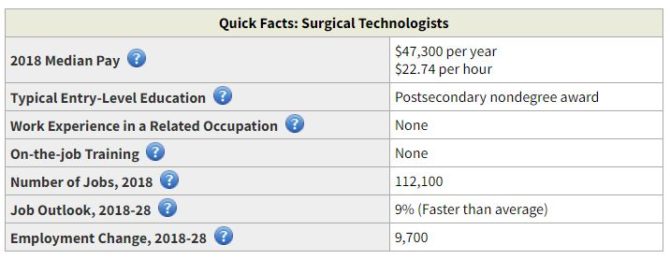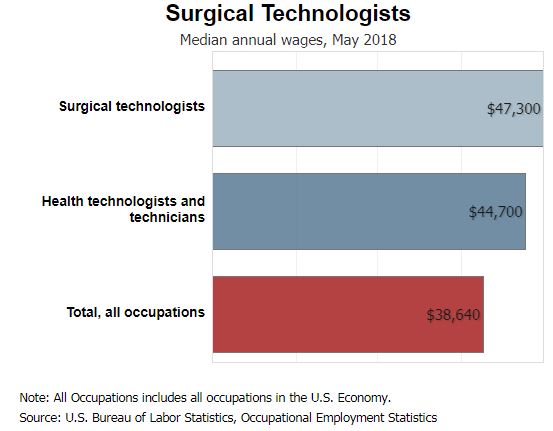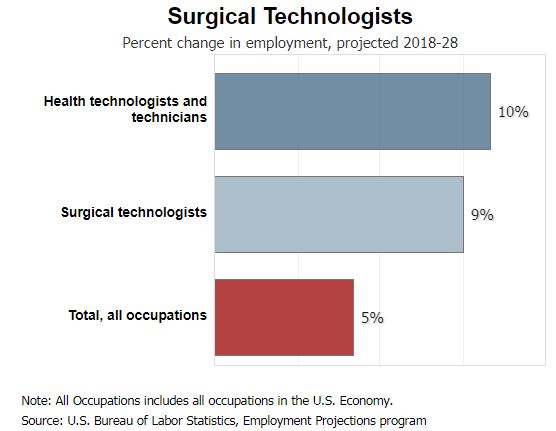Surgical Technologist
Angela | January 22, 2020
667 Views
81 Likes
4.73
On 15 Ratings
Related
Surgical Technologist
Surgical technologists, also called operating room technicians, assist with operations. They prepare operating rooms, arrange equipment, and help doctors during surgeries.

Surgical technologists typically do the following:
- Prepare operating rooms for surgery
- Sterilize equipment and make sure that there are adequate supplies for surgery
- Ready patients for surgery, such as by washing and disinfecting incision sites
- Help surgeons during surgery by passing them instruments and other sterile supplies
- Count supplies, such as surgical instruments, to ensure that no foreign objects are retained in patients
- Maintain a sterile environment to prevent patient infection
Surgical technologists work as members of a healthcare team alongside physicians and surgeons, registered nurses, and other healthcare workers.
Before an operation, surgical technologists prepare the operating room by setting up surgical instruments and equipment. They prepare sterile solutions and medications used in surgery and check that all surgical equipment is working properly. Surgical technologists also bring patients to the operating room and get them ready for surgery by positioning them on the table, covering them with sterile drapes, and washing and disinfecting incision sites. And they help the surgical team put on sterile gowns.
During an operation, surgical technologists pass the sterile instruments and supplies to surgeons and first assistants. They might hold retractors, hold internal organs in place during the procedure, or set up robotic surgical equipment. Technologists also may handle specimens taken for laboratory analysis.
After the operation is complete, surgical technologists may apply bandages and other dressings to the incision site. They may also transfer patients to recovery rooms and restock operating rooms after a procedure.
Surgical first assistants have a hands-on role, directly assisting surgeons during a procedure. For example, they may help to suction the incision site or suture a wound.
Surgical technologists held about 112,100 jobs in 2018. The largest employers of surgical technologists were as follows:
| Hospitals; state, local, and private | 72% |
| Outpatient care centers | 11 |
| Offices of physicians | 10 |
| Offices of dentists | 3 |
Ambulatory surgical centers are included in outpatient care centers.
Surgical technologists wear scrubs and sterile gowns, gloves, caps, and masks while they are in the operating room. Their work may be physically demanding, requiring them to be on their feet for long periods. Surgical technologists also may need to help move patients or lift heavy trays of medical supplies. At times, they may be exposed to communicable diseases and unpleasant sights, odors, and materials.
Work Schedules
Most surgical technologists work full time. Surgical technologists employed in hospitals may work or be on call during nights, weekends, and holidays. They may also be required to work shifts lasting longer than 8 hours.
Surgical technologists typically need a diploma, certificate, or associate’s degree from an accredited surgical technology program. Many community colleges and vocational schools, as well as some universities and hospitals, offer accredited programs that range in length from several months to 2 years.
Surgical technology education includes courses such as anatomy, microbiology, and physiology. They also learn about the care and safety of patients, sterilization techniques, how to set up technical or robotic equipment, and preventing and controlling infections. In addition to classroom study, students gain hands-on experience in supervised clinical settings.
Surgical first assistants may complete a formal education program in surgical assisting. Others may work as surgical technologists and receive additional on-the-job training to become first assistants.
There are about 500 surgical technologist programs accredited by the Commission on Accreditation of Allied Health Education Programs (CAAHEP).
Important Qualities
Communication. To prevent infections or other complications, surgical technologists must relay any issues that arise during surgery to the other members of the healthcare team.
Detail oriented. Surgical technologists must pay close attention to their work. For example, they need to provide the correct sterile equipment for surgeons during an operation.
Dexterity. Surgical technologists should be comfortable working with their hands. They must provide needed equipment quickly.
Integrity. Because they are trusted to provide sterile supplies and care for patients during surgical procedures, surgical technologists must be ethical and honest.
Listening skills. Responding to requests from surgeons and others on the surgical team requires the ability to listen to and understand spoken directions.
Physical stamina. Surgical technologists should be comfortable standing for extended periods.
Stress-management skills. Working in an operating room can be stressful. Surgical technologists should work well under pressure.
Licenses, Certifications, and Registrations
Certification may be beneficial for finding a job. Surgical technologists may earn certification through credentialing organizations.
Certification through the National Board of Surgical Technology and Surgical Assisting allows the use of the title “Certified Surgical Technologist (CST).” Certification typically requires completing an accredited formal education program or military training program and passing an exam.
Certification through the National Center for Competency Testing allows the use of the title “Tech in Surgery – Certified or TS-C (NCCT).” Applicants may qualify through formal education, military training, or work experience. All require documenting critical skills and passing an exam.
Both certifications require surgical technologists to complete continuing education to maintain their certification.
In addition, many jobs require technologists to become certified in CPR or basic life support (BLS), or both.
A small number of states have regulations governing the work of surgical technologists or surgical first assistants, or both.
The National Board of Surgical Technology and Surgical Assisting, the National Commission for the Certification of Surgical Assistants, and the American Board of Surgical Assistants offer certification for surgical first assistants.
The median annual wage for surgical technologists was $47,300 in May 2018. The median wage is the wage at which half the workers in an occupation earned more than that amount and half earned less. The lowest 10 percent earned less than $32,870, and the highest 10 percent earned more than $69,170.

In May 2018, the median annual wages for surgical technologists in the top industries in which they worked were as follows:
| Outpatient care centers | $50,340 |
| Hospitals; state, local, and private | 46,990 |
| Offices of physicians | 46,670 |
| Offices of dentists | 45,030 |
Most surgical technologists work full time. Surgical technologists employed in hospitals may work or be on call during nights, weekends, and holidays. They may also be required to work shifts lasting longer than 8 hours.

Employment of surgical technologists is projected to grow 9 percent from 2018 to 2028, faster than the average for all occupations. Advances in medical technology have made surgery safer, and more operations are being done to treat a variety of illnesses and injuries.
In addition, the aging of the large baby-boom generation is expected to increase the need for surgical technologists because older people usually require more operations. Moreover, as these individuals age, they may be more willing than those in previous generations to seek medical treatment to improve their quality of life. For example, an individual may decide to have a knee replacement operation in order to maintain an active lifestyle or to have cataracts removed to improve vision.
Job Prospects
Job prospects should be best for surgical technologists who have completed an accredited education program and hold a certification.
Bureau of Labor Statistics, U.S. Department of Labor, Occupational Outlook Handbook, Surgical Technologists,
on the Internet at https://www.bls.gov/ooh/healthcare/surgical-technologists.htm (visited January 07, 2020).
Salary information comes from the Bureau of Labor Statistics, Occupational Employment Statistics Program, a semi-annual survey that provides wage and employment statistics for the nation, each state, and sub-state regions.
Tagged as AC, Amarillo College, BSA Health System, Career, Clarendon College, Education, Frank Phillips College, Healthcare, Hometown Success, Jobs Ya'll, Occupation, Region 16, Texas, Texas Panhandle, Texas Workforce Commission, West Texas A&M University, Workforce Solutions Panhandle, WTAMU.
Written by Angela








